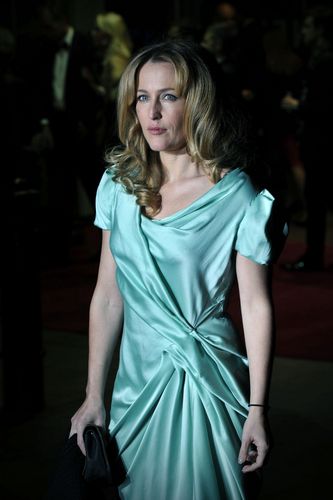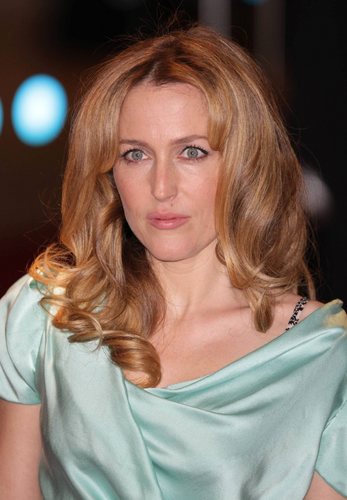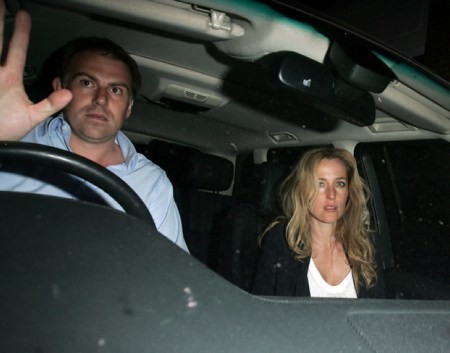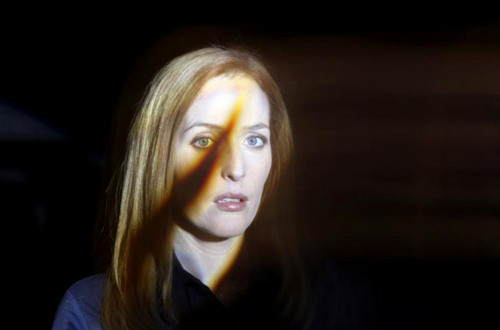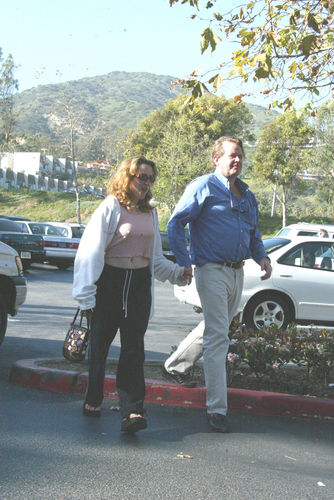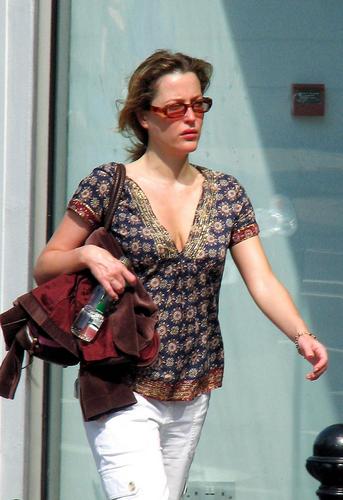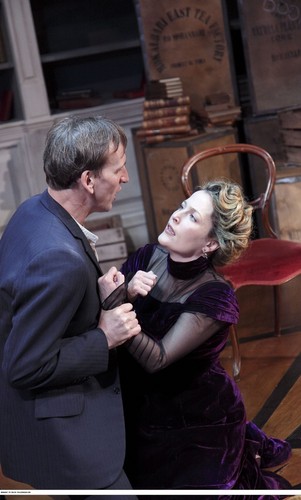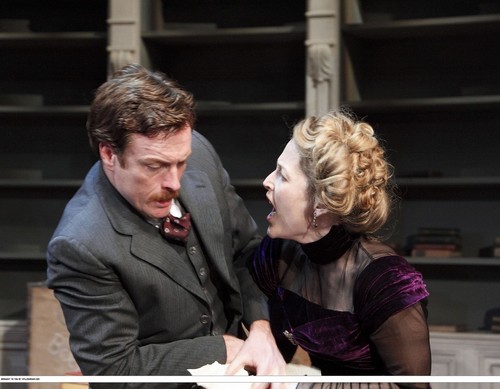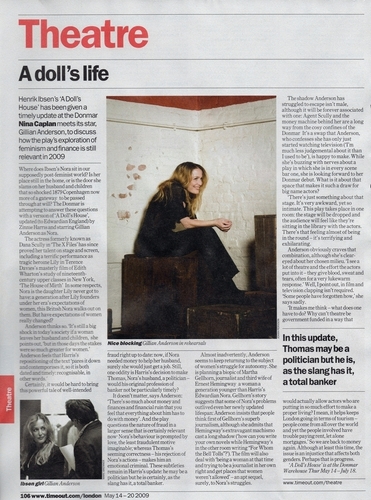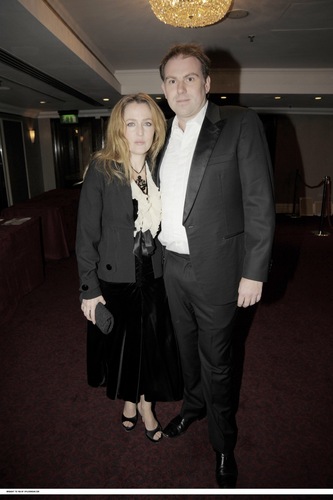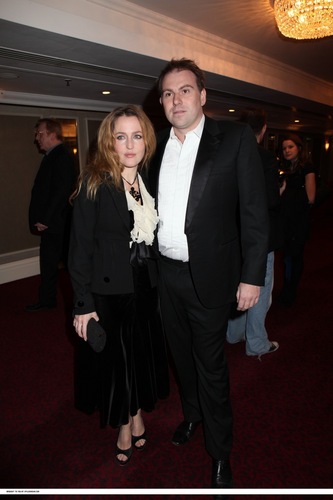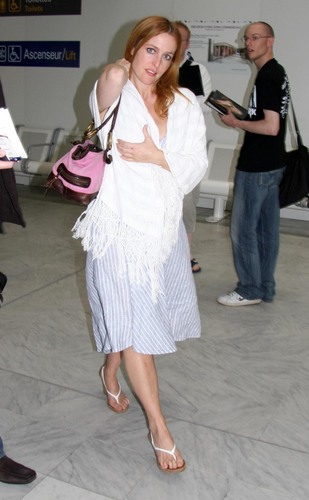There was a time when the world went mad for Gillian Anderson. Or at least for Dana Scully, the sceptical FBI agent she played in The X-Files.
Internet sites with names like Gillian Anderson’s Testosterone Brigade sprung up, with devotees captivated by her cerebral yet sultry demeanour. FHM voted her Sexiest Woman in the World in 1996, after an April cover shoot sold so quickly that fans bombarded the magazine’s office with requests for back issues (one hopeful even sent in an unsolicited cheque for $200). When she arrived in Australia to promote the show, for a series of signings in shopping malls, there was a virtual stampede as thousands flocked to see her.
Today, she walks down London’s Bond Street, past the window of the luxurious Westbury Hotel where we meet, undisturbed. “I don’t usually get stopped,” she tells me, now safely ensconced on a sofa and ordering a latte. “People are pretty respectful. It’s mostly people turning heads going, ‘Wasn’t that…?’” It’s easy to see why. Her long hair now a blend of brown and blonde – some way from the distinctive auburn crop she sported in the show. At 5ft 3in, she’s also much shorter than you might imagine – a testament, perhaps, to her towering turns as Scully (or the fact that she stood on a box to shoot many of her scenes with 6ft co-star David Duchovny).
If anyone did stop her, they’d find a woman unafraid to lower her guard. She talks freely, unafraid to ditch Hollywood protocol for the sake of a good anecdote. Take her FHM photo-shoot experience. “Nothing was working and somehow we ended up with me on the bed in my underwear. It wasn’t the intention when I walked in the door. My manager was going, ‘What are you doing?’” It didn’t help that the accompanying article was “taken out of context”. As she later noted, “The biggest misconception that’s grown out of the FHM piece is that I lost my virginity to a neo-Nazi. The truth is, I lost my virginity to a guy who later became a neo-Nazi. Which is not the same thing…”
Dressed in black – jeans, boots, a zip-up top and trench coat – Anderson still appears as striking as she did back then. Now 41, she finds the whole sex-symbol thing rather funny. Not least because, while it wasn’t until the fourth season that she began intentionally to streamline Scully’s look, in the early years she allowed her weight to fluctuate. “There were periods in the show where my weight kept going up and down, depending on my state of mind,” she says. “Sometimes, I was terribly fit and sometimes I was terribly chubby and sometimes I was terribly pregnant … but what it did was present a character that was very recognisable in Middle America.”
With its mix of the paranormal and sci-fi, The X-Files became a cultural touchstone of the Nineties, and Anderson its pin-up star. Cast when she was just 24, the show ran for almost a decade, winning her an Emmy and a Golden Globe. Yet given the impact it made, it’s surprising to discover that she never feared being able to shake off Scully. “At the time I thought, ‘There’s no way that I am going to be typecast in any way.’” And now? She pauses for a diplomatic beat. “It’s a challenging time right now, period, in the film industry. I still have to remind people that I can do various things and not just that.”
Since The X-Files series concluded in 2002, Anderson has plied her trade in independent films. She was magnificent as the tragic Lily Bart in Terence Davies’ Edith Wharton adaptation The House of Mirth, just as she was almost unrecognisable as a Belfast mother, complete with thick Ulster accent, in The Mighty Celt. More recently, she won a Bafta for her Lady Dedlock in a BBC adaptation of Bleak House and oozed bile as a Hollywood agent in the film take on Toby Young’s media memoir, How To Lose Friends and Alienate People. All were part of a conscious decision to choose smaller projects and put her family first. “When I do something that takes me away for three months at a time, I don’t necessarily like that feeling of the separation,” she says.
And the fact that she is London-based was one reason she was attracted to her latest film, Boogie Woogie. A black satire on the London art scene, based on former dealer Danny Moynihan’s autobiographical novel, it’s directed by Duncan Ward, whose previous work includes documentaries on such artists as Tadeusz Kantor and Leon Tarasewicz. Anderson already knew both Ward and his wife, the exhibition curator Mollie Dent-Brocklehurst – yet even she admits it took a while to decide whether she wanted to do the film. “I remember when I first read it, I thought it was quite catty,” she says. “Then the more I read it, as I was trying to decide whether I’d do it, it just felt more real somehow.”
The huge cast includes Jaime Winstone, Alan Cumming, Christopher Lee and Charlotte Rampling, all of whom play a motley collection of artists, dealers, curators and wannabes steeped in the seedier side of the industry. It’s a world full of “desperation, one-upmanship, competitiveness and back-biting,” says Anderson, in what also sounds like a fairly accurate description of the film industry. She plays Jean Maclestone, the wife of a wealthy collector (Stellan Skarsgard), who becomes embroiled in an affair with a young artist (Jack Huston). If the film is erratic in places, with too many sub-plots colliding, hers is a teasing portrait of middle-aged loneliness and vulnerability.
Anderson is something of an art fanatic herself. “It’s been a big part of my life,” she says. “I’ve collected in my own small way over the years.” While there’s “a whole zone that I’m not in” – meaning the Damien Hirst bracket – she owns work by photographers such as Helen Levitt, Diane Arbus and Cindy Sherman, as well as “a big Francesco Clemente piece”. Currently, she’s run out of wall space. “I’m not a person who collects and has them in storage somewhere. I can’t quite fathom that. I like seeing them. Some people rotate – properly rotate – their art. I’m not that organised. I mean, I’m very organised but I’m not organised enough to do that.”
She now lives on the outskirts of London, with her partner and their children, a move that’s brought her back full circle in some ways. Though born in Chicago – and following a brief sojourn to Puerto Rico when she was an infant – she spent her tender years in the north London suburb of Crouch End. Her family moved there when she was two, after her father, Edward, won a place at the London Film School. “I haven’t been back in such a long time,” she says of the area. As she tells me about buying liquorice sticks and the felicitously named Lolly Gobble Choc Bombs at the local corner shop, it seems that her childhood memories are as vivid as her accent, which flip-flops between British and American, depending on what time-zone she’s in.
With two younger siblings, Zoe and Aaron, arriving during those Crouch End years, it was their mother Rosemary who was the primary breadwinner. A computer analyst working for Lloyds Bank, “she’d come home with these huge reams of paper, with the holes in the side,” Anderson grins. “That was my drawing paper.” Her father, meanwhile, found employment on the fringes of the British film industry, first selling camera filters and then working for a company stationed just below the offices where Monty Python’s animations were created. By the time Anderson was 11, though, Edward was offered a job directing commercials and the family returned to the States, relocating to Grand Rapids, Michigan.
It was shortly afterwards that Anderson decided to audition for a local production of Alice in Wonderland. “There were a hundred other girls. I didn’t get it and I thought, ‘I’m not meant to do this,’ and I stopped.” It took another two years before she plucked up the courage to try again – but this time she won a role in a community theatre piece. “All of a sudden, I was happy,” she says. “I knew what I wanted to do. It was completely revelatory. I felt like I knew who I was. A lightbulb went on, and I think I felt more sure of myself, that I knew what direction I was going in.” Her early teenage years had been typically traumatic up until then. “I didn’t particularly like school. I didn’t really feel like I fitted in or belonged.”
You only had to glimpse her dress sense – which went from new wave to thrift store to “pointy boots and Mohawks” – to see this. Deep into the punk scene, Anderson pierced her nose and shaved the sides of her head with a razor blade, dyeing her hair in lurid colours. But while she spent plenty of time listening to the Circle Jerks, Butthole Surfers and Bauhaus, the phase never evolved into full-blown rebellion. She was already doing an internship at the Grand Rapids Civic Theatre when a friend suggested she apply to the Goodman School of Drama in Chicago. “That was the only place I auditioned,” she notes. “I have a tendency to be naïve, but it worked out because I got accepted. It didn’t occur to me until later what I’d have done if I hadn’t.”
Given her father’s profession, it seemed obvious to others that she should veer towards acting, though she’s less sure. “It wasn’t something that was discussed at home. I didn’t meet any actors then and I don’t know if I connected what he did to the films that I saw in the movie theatre … He did give me a talk once. He was always very practical with his advice. While I was in college studying acting, the likelihood of me getting work was so low, he felt I should have something on the side. So he thought I should learn word processing so I could teach other people how to do it. And that’s exactly what I should’ve done! But I waited tables and made cappuccinos.”
She spent four years living in New York and working in the theatre before eventually moving to Los Angeles in 1992 for a gruelling – and often fruitless – year of auditioning. Even when The X-Files rolled around, Fox Television were not keen – they wanted an actress more in the mould of Anderson’s namesake, Pamela. “If you look at what was on TV at the time back then… it was Beverly Hills 90210,” she recalls. “There was a particular formula that worked. And the formula that [X-Files creator] Chris Carter was proposing just didn’t make sense to anybody, because it’d never been tried. What worked then was incredibly beautiful and voluptuous. That’s certainly not what I was when I showed up for the audition.”
With Carter pressing for Anderson in the role, she won out. But committing to a long-running series meant she had virtually no social life, so it’s no surprise that within a year, she married a crew member – the Canadian-born assistant art director Clyde Klotz. They wed at the 17th hole of a golf course in a Buddhist ceremony and their marriage lasted less than three years – though it did produce one child, Piper, who is now 15. A decade on from her daughter’s birth, Anderson entered into a second marriage, with documentary film-maker Julian Ozanne. This lasted even less time than her first – just 16 months.
Anderson concedes it hasn’t been easy living out her private life in public. “There have been various times when I’ve got a lot of hassle. I like to stay under the radar. I get quite annoyed about it sometimes. I shouldn’t but I do. When I was living in California, I’d try and take my daughter out to the park on my odd day off, and it’s infuriating not to be able to do it privately. It’s just horrible.” She’s been on the gossip pages too – not least when, in early 2006, shortly after the demise of her union to Ozanne, she announced she was pregnant with her second child, Oscar, courtesy of her new partner, the businessman Mark Griffiths (who made his fortune working in the wheel-clamping business).
Felix, her third child – and the couple’s second – arrived two years later. Anderson acknowledges it’s been easier living with someone who isn’t in the public eye. “I’m sure that has a very good impact on the situation.” Will she marry again? “I don’t know. I don’t know,” she says, slowly. “Undoubtedly, it will happen at some point. But I just don’t want the fact of it to change how things are. Things are fantastic the way that they are. And I’m slightly worried that there’s something in me that … it all feels fine. I’ve already done it. I just don’t want to screw things up. Things are great just as they are.” She pauses for a second. “But I probably will at some point.”
Since returning to London, she’s taken to the stage again – she was nominated for a Best Actress Olivier Award for her turn as Nora in last year’s Donmar production of A Doll’s House. Yet, with a small role in a forthcoming mini-series adaptation of Moby Dick, she also hasn’t ruled out the possibility of slipping on Scully’s shoes again. Having reprised the character for the second spin-off movie, I Want to Believe, back in 2008, she says there’s “desire” from Carter et al to make a third film, something she’d be open to. She also wants to direct – with plans afoot for a biopic of war photographer Martha Gellhorn and an adaptation of Elizabeth Rosner’s Holocaust-themed novel The Speed of Light.
Still, although she has a production company, Fiddlehead, she assures me she’s not a careerist. “I’m very pro-active but I’m not terribly ambitious. So there’s part of me that takes what comes. I don’t read Variety. I don’t do any of that stuff.” But things are changing as the kids become older. “I’m starting to feel a bit more energised,” she says. As if to prove it, she dons her coat and springs up off the sofa. Businesslike, she shakes my hand and glances back at the table. “You can have my chocolate,” she says, looking at the discarded confection that came with her coffee. It’s the sort of memento X-Files fans might kill for – even now.
‘Boogie Woogie’ opens nationwide on Friday
Internet sites with names like Gillian Anderson’s Testosterone Brigade sprung up, with devotees captivated by her cerebral yet sultry demeanour. FHM voted her Sexiest Woman in the World in 1996, after an April cover shoot sold so quickly that fans bombarded the magazine’s office with requests for back issues (one hopeful even sent in an unsolicited cheque for $200). When she arrived in Australia to promote the show, for a series of signings in shopping malls, there was a virtual stampede as thousands flocked to see her.
Today, she walks down London’s Bond Street, past the window of the luxurious Westbury Hotel where we meet, undisturbed. “I don’t usually get stopped,” she tells me, now safely ensconced on a sofa and ordering a latte. “People are pretty respectful. It’s mostly people turning heads going, ‘Wasn’t that…?’” It’s easy to see why. Her long hair now a blend of brown and blonde – some way from the distinctive auburn crop she sported in the show. At 5ft 3in, she’s also much shorter than you might imagine – a testament, perhaps, to her towering turns as Scully (or the fact that she stood on a box to shoot many of her scenes with 6ft co-star David Duchovny).
If anyone did stop her, they’d find a woman unafraid to lower her guard. She talks freely, unafraid to ditch Hollywood protocol for the sake of a good anecdote. Take her FHM photo-shoot experience. “Nothing was working and somehow we ended up with me on the bed in my underwear. It wasn’t the intention when I walked in the door. My manager was going, ‘What are you doing?’” It didn’t help that the accompanying article was “taken out of context”. As she later noted, “The biggest misconception that’s grown out of the FHM piece is that I lost my virginity to a neo-Nazi. The truth is, I lost my virginity to a guy who later became a neo-Nazi. Which is not the same thing…”
Dressed in black – jeans, boots, a zip-up top and trench coat – Anderson still appears as striking as she did back then. Now 41, she finds the whole sex-symbol thing rather funny. Not least because, while it wasn’t until the fourth season that she began intentionally to streamline Scully’s look, in the early years she allowed her weight to fluctuate. “There were periods in the show where my weight kept going up and down, depending on my state of mind,” she says. “Sometimes, I was terribly fit and sometimes I was terribly chubby and sometimes I was terribly pregnant … but what it did was present a character that was very recognisable in Middle America.”
With its mix of the paranormal and sci-fi, The X-Files became a cultural touchstone of the Nineties, and Anderson its pin-up star. Cast when she was just 24, the show ran for almost a decade, winning her an Emmy and a Golden Globe. Yet given the impact it made, it’s surprising to discover that she never feared being able to shake off Scully. “At the time I thought, ‘There’s no way that I am going to be typecast in any way.’” And now? She pauses for a diplomatic beat. “It’s a challenging time right now, period, in the film industry. I still have to remind people that I can do various things and not just that.”
Since The X-Files series concluded in 2002, Anderson has plied her trade in independent films. She was magnificent as the tragic Lily Bart in Terence Davies’ Edith Wharton adaptation The House of Mirth, just as she was almost unrecognisable as a Belfast mother, complete with thick Ulster accent, in The Mighty Celt. More recently, she won a Bafta for her Lady Dedlock in a BBC adaptation of Bleak House and oozed bile as a Hollywood agent in the film take on Toby Young’s media memoir, How To Lose Friends and Alienate People. All were part of a conscious decision to choose smaller projects and put her family first. “When I do something that takes me away for three months at a time, I don’t necessarily like that feeling of the separation,” she says.
And the fact that she is London-based was one reason she was attracted to her latest film, Boogie Woogie. A black satire on the London art scene, based on former dealer Danny Moynihan’s autobiographical novel, it’s directed by Duncan Ward, whose previous work includes documentaries on such artists as Tadeusz Kantor and Leon Tarasewicz. Anderson already knew both Ward and his wife, the exhibition curator Mollie Dent-Brocklehurst – yet even she admits it took a while to decide whether she wanted to do the film. “I remember when I first read it, I thought it was quite catty,” she says. “Then the more I read it, as I was trying to decide whether I’d do it, it just felt more real somehow.”
The huge cast includes Jaime Winstone, Alan Cumming, Christopher Lee and Charlotte Rampling, all of whom play a motley collection of artists, dealers, curators and wannabes steeped in the seedier side of the industry. It’s a world full of “desperation, one-upmanship, competitiveness and back-biting,” says Anderson, in what also sounds like a fairly accurate description of the film industry. She plays Jean Maclestone, the wife of a wealthy collector (Stellan Skarsgard), who becomes embroiled in an affair with a young artist (Jack Huston). If the film is erratic in places, with too many sub-plots colliding, hers is a teasing portrait of middle-aged loneliness and vulnerability.
Anderson is something of an art fanatic herself. “It’s been a big part of my life,” she says. “I’ve collected in my own small way over the years.” While there’s “a whole zone that I’m not in” – meaning the Damien Hirst bracket – she owns work by photographers such as Helen Levitt, Diane Arbus and Cindy Sherman, as well as “a big Francesco Clemente piece”. Currently, she’s run out of wall space. “I’m not a person who collects and has them in storage somewhere. I can’t quite fathom that. I like seeing them. Some people rotate – properly rotate – their art. I’m not that organised. I mean, I’m very organised but I’m not organised enough to do that.”
She now lives on the outskirts of London, with her partner and their children, a move that’s brought her back full circle in some ways. Though born in Chicago – and following a brief sojourn to Puerto Rico when she was an infant – she spent her tender years in the north London suburb of Crouch End. Her family moved there when she was two, after her father, Edward, won a place at the London Film School. “I haven’t been back in such a long time,” she says of the area. As she tells me about buying liquorice sticks and the felicitously named Lolly Gobble Choc Bombs at the local corner shop, it seems that her childhood memories are as vivid as her accent, which flip-flops between British and American, depending on what time-zone she’s in.
With two younger siblings, Zoe and Aaron, arriving during those Crouch End years, it was their mother Rosemary who was the primary breadwinner. A computer analyst working for Lloyds Bank, “she’d come home with these huge reams of paper, with the holes in the side,” Anderson grins. “That was my drawing paper.” Her father, meanwhile, found employment on the fringes of the British film industry, first selling camera filters and then working for a company stationed just below the offices where Monty Python’s animations were created. By the time Anderson was 11, though, Edward was offered a job directing commercials and the family returned to the States, relocating to Grand Rapids, Michigan.
It was shortly afterwards that Anderson decided to audition for a local production of Alice in Wonderland. “There were a hundred other girls. I didn’t get it and I thought, ‘I’m not meant to do this,’ and I stopped.” It took another two years before she plucked up the courage to try again – but this time she won a role in a community theatre piece. “All of a sudden, I was happy,” she says. “I knew what I wanted to do. It was completely revelatory. I felt like I knew who I was. A lightbulb went on, and I think I felt more sure of myself, that I knew what direction I was going in.” Her early teenage years had been typically traumatic up until then. “I didn’t particularly like school. I didn’t really feel like I fitted in or belonged.”
You only had to glimpse her dress sense – which went from new wave to thrift store to “pointy boots and Mohawks” – to see this. Deep into the punk scene, Anderson pierced her nose and shaved the sides of her head with a razor blade, dyeing her hair in lurid colours. But while she spent plenty of time listening to the Circle Jerks, Butthole Surfers and Bauhaus, the phase never evolved into full-blown rebellion. She was already doing an internship at the Grand Rapids Civic Theatre when a friend suggested she apply to the Goodman School of Drama in Chicago. “That was the only place I auditioned,” she notes. “I have a tendency to be naïve, but it worked out because I got accepted. It didn’t occur to me until later what I’d have done if I hadn’t.”
Given her father’s profession, it seemed obvious to others that she should veer towards acting, though she’s less sure. “It wasn’t something that was discussed at home. I didn’t meet any actors then and I don’t know if I connected what he did to the films that I saw in the movie theatre … He did give me a talk once. He was always very practical with his advice. While I was in college studying acting, the likelihood of me getting work was so low, he felt I should have something on the side. So he thought I should learn word processing so I could teach other people how to do it. And that’s exactly what I should’ve done! But I waited tables and made cappuccinos.”
She spent four years living in New York and working in the theatre before eventually moving to Los Angeles in 1992 for a gruelling – and often fruitless – year of auditioning. Even when The X-Files rolled around, Fox Television were not keen – they wanted an actress more in the mould of Anderson’s namesake, Pamela. “If you look at what was on TV at the time back then… it was Beverly Hills 90210,” she recalls. “There was a particular formula that worked. And the formula that [X-Files creator] Chris Carter was proposing just didn’t make sense to anybody, because it’d never been tried. What worked then was incredibly beautiful and voluptuous. That’s certainly not what I was when I showed up for the audition.”
With Carter pressing for Anderson in the role, she won out. But committing to a long-running series meant she had virtually no social life, so it’s no surprise that within a year, she married a crew member – the Canadian-born assistant art director Clyde Klotz. They wed at the 17th hole of a golf course in a Buddhist ceremony and their marriage lasted less than three years – though it did produce one child, Piper, who is now 15. A decade on from her daughter’s birth, Anderson entered into a second marriage, with documentary film-maker Julian Ozanne. This lasted even less time than her first – just 16 months.
Anderson concedes it hasn’t been easy living out her private life in public. “There have been various times when I’ve got a lot of hassle. I like to stay under the radar. I get quite annoyed about it sometimes. I shouldn’t but I do. When I was living in California, I’d try and take my daughter out to the park on my odd day off, and it’s infuriating not to be able to do it privately. It’s just horrible.” She’s been on the gossip pages too – not least when, in early 2006, shortly after the demise of her union to Ozanne, she announced she was pregnant with her second child, Oscar, courtesy of her new partner, the businessman Mark Griffiths (who made his fortune working in the wheel-clamping business).
Felix, her third child – and the couple’s second – arrived two years later. Anderson acknowledges it’s been easier living with someone who isn’t in the public eye. “I’m sure that has a very good impact on the situation.” Will she marry again? “I don’t know. I don’t know,” she says, slowly. “Undoubtedly, it will happen at some point. But I just don’t want the fact of it to change how things are. Things are fantastic the way that they are. And I’m slightly worried that there’s something in me that … it all feels fine. I’ve already done it. I just don’t want to screw things up. Things are great just as they are.” She pauses for a second. “But I probably will at some point.”
Since returning to London, she’s taken to the stage again – she was nominated for a Best Actress Olivier Award for her turn as Nora in last year’s Donmar production of A Doll’s House. Yet, with a small role in a forthcoming mini-series adaptation of Moby Dick, she also hasn’t ruled out the possibility of slipping on Scully’s shoes again. Having reprised the character for the second spin-off movie, I Want to Believe, back in 2008, she says there’s “desire” from Carter et al to make a third film, something she’d be open to. She also wants to direct – with plans afoot for a biopic of war photographer Martha Gellhorn and an adaptation of Elizabeth Rosner’s Holocaust-themed novel The Speed of Light.
Still, although she has a production company, Fiddlehead, she assures me she’s not a careerist. “I’m very pro-active but I’m not terribly ambitious. So there’s part of me that takes what comes. I don’t read Variety. I don’t do any of that stuff.” But things are changing as the kids become older. “I’m starting to feel a bit more energised,” she says. As if to prove it, she dons her coat and springs up off the sofa. Businesslike, she shakes my hand and glances back at the table. “You can have my chocolate,” she says, looking at the discarded confection that came with her coffee. It’s the sort of memento X-Files fans might kill for – even now.
‘Boogie Woogie’ opens nationwide on Friday


